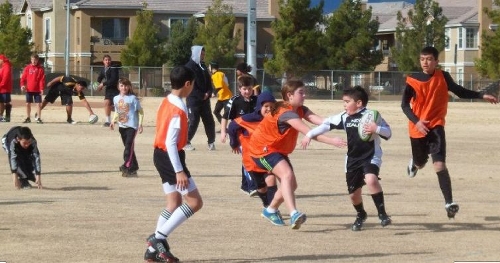Game of rugby beginning to thrive in Las Vegas Valley
Rugby players and enthusiasts from all over the world are expected to invade Las Vegas with the USA Sevens International Rugby Tournament slated for Feb. 9-12 at Sam Boyd Stadium. But Las Vegas residents don't have to travel far year-round to witness -- and play -- the growing sport.
When it comes to being involved in rugby, there are a variety of opportunities available to people in the valley. The Las Vegas Blackjacks, a rugby club founded in 1976, are an organization that works to elevate local interest in the sport. Tom Carter, team captain, said though the club won the 2010 USA Rugby National competition, the sport still lacks support from the community.
"Even though (rugby) is growing in other parts of the world, it's still not a well-known sport," Carter said. "Las Vegas really needs a sport to support, so why not grow the game of rugby?"
The Blackjacks compete in the Southern California Rugby Football Union, and the club is open to "anyone willing to give rugby a try," Carter said. The cost to join the Blackjacks for a season is $75, which includes training expenses.
Carter said one of the club's most notable aspects is its ability to attract players of all backgrounds.
"We get some foreign guys, mostly Irish, who are good for the game because they teach a lot of Americans how to play (rugby)," Carter said. "The guys who play are loyal, and I've been really impressed with them."
The Blackjacks have partnerships with notable local and international rugby organizations, including the Montpellier Hérault Rugby Club in France, which has acquired some of the Blackjacks to play professionally, and the Las Vegas Rugby Academy, which teaches youths ages 5 to 18 contact and non-contact rugby.
Vaha Esikia, Las Vegas Rugby Academy director, said youths are encouraged to attend one of the training sessions, which last from 5 to 7 p.m. every Tuesday and Thursday at Sunset Park, Sunset Road and Eastern Avenue, at no cost. He said the academy includes about 100 children and nine coaches, all former or current international rugby players. The Blackjacks member and former U.S. national team player is working to establish opportunities for those ages 18 to 23 to play rugby competitively.
Esikia said, in addition to teaching children basic rugby skills, sportsmanship and teamwork are key components.
"On the field, we rough each other up, but afterward, we sit down and talk with (opposing players)," Esikia said. "We try to teach (the youths) that when we host a team, we sit down and interact with them after. It's an important part of the sport."
Esikia said youths look forward to interacting with adult players, especially international players from the USA Sevens Rugby tournament and the Blackjacks.
"The kids always look forward to (working with) international players and the Blackjacks," Esikia said. "We get the Blackjacks to come out and teach kids or give the kids an opportunity to watch them play. It shows them what they need to do, and they listen better."
Rugby opportunities are not just for adults and youths. The Sin City Skulls, Las Vegas' quad rugby club, welcomes athletes with disabilities to play from April to October and into the postseason.
The Sin City Skulls practice from 5:30 to 7 p.m. every Friday at the Chuck Minker Sports Complex, 275 N. Mojave Road. Bob Murray, inclusive recreation specialist with the city of Las Vegas, said quad rugby is rapidly growing.
"Rugby is one of the fastest-growing wheelchair sports in the world," Murray said. "This organization is great, and (it's part of) the only full-contact wheelchair sport out there."
Rugby opportunities extend to the cultural side as well, according to Dane Ngahuka, president and head coach of the Las Vegas Maori Rugby Club. Ngahuka said the club is open to anyone interested, but it places a focus on the Polynesian culture of rugby.
"After playing rugby (in Las Vegas) for a while, I noticed it would be fun to have a cultural aspect to the sport," Ngahuka said. "I talked to the Polynesian community about starting a club, and now we're going into our third season."
Ngahuka said the club presents the Polynesian culture, often by performing the Haka, a Maori war chant, before the game. Although the Maori culture is a large part of the club, Ngahuka said the organization is grounded by teamwork.
"There is very little individual competition in rugby," Ngahuka said. "You must support your players and be a team player. Anyone on the field has an opportunity to make a try."
Contact Paradise/Downtown View reporter Lisa Carter at lcarter@viewnews.com or 383-4686.






















